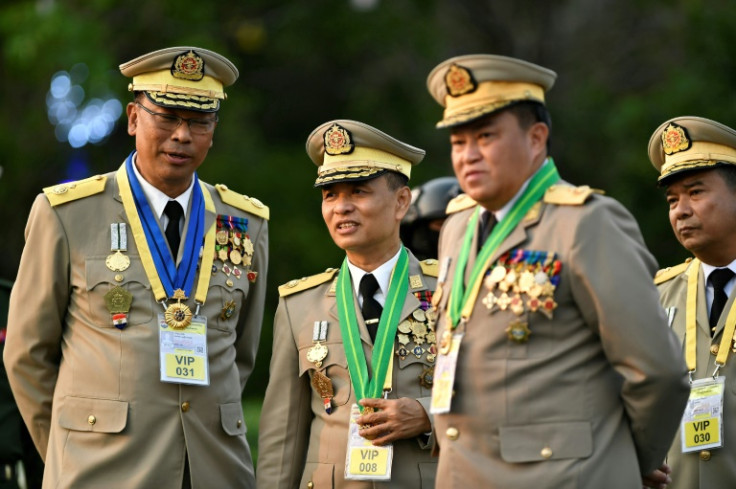
Myanmar's junta chief on Wednesday blamed the country's growing armed resistance movement for preventing long-promised elections in a speech to thousands of soldiers following an Armed Forces Day parade.
The military has suffered a series of major losses to an alliance of ethnic minority armed groups, and earlier this week admitted it may not be possible to hold elections all over the country due to the instability.
Three years after seizing power in a coup, the junta is now grappling with its most serious threat yet, according to experts, with casualties and defections taking a toll.
Without offering a timeline, junta chief Min Aung Hlaing said efforts to conduct elections were under way, but blamed armed ethnic groups and "so-called People's Defense Forces" for "deliberately engaging in disruptive actions to sabotage and delay" the process.
The parade in capital Naypyidaw began late afternoon -- a concession to the hot weather, according to the junta -- with the Myanmar leader's wife seen placing garlands of flowers on soldiers.
And unlike in previous years, when Min Aung Hlaing presided over rolling tanks and missile launchers, there were scant displays of heavy weaponry.
Instead, as night fell, a technicolour display of lights illuminated the parade ground as rows of men and women marched beneath three spotlit statues of Myanmar's empire-building kings.
The Armed Forces Day parade commemorates the start of resistance to the Japanese occupation during World War II.
Security in the junta's remote, purpose-built capital, was tight, with few cars on the roads in the run-up to the event.
The February 2021 coup against Aung San Suu Kyi's elected government unleashed turmoil that has left thousands dead and shattered Myanmar's economy.
Over the past six months, the generals' grip on power has looked shakier than ever with dozens of anti-junta "People's Defence Forces" (PDFs) battling the army across the country.
In October, an alliance of ethnic minority fighters launched a surprise offensive in northern Shan state, capturing territory and taking control of lucrative trade routes to China.
Tom Andrews, the UN's special rapporteur on the human rights situation in Myanmar, said last week that battlefield losses and problems with recruitment were posing "an existential threat for the Myanmar military".
The situation has driven the junta to enforce a military service law, allowing it to call up all men aged 18-35 and women aged 18-27 for two years' service.
The announcement last month, which Min Aung Hlaing on Wednesday defended as a necessity, prompted thousands of potential recruits to try to flee the country, with the Thai embassy in Yangon deluged with visa applicants.
The military justified its coup with unsubstantiated claims of electoral fraud during 2020 polls won by Nobel laureate Suu Kyi's National League for Democracy (NLD) party.
It has repeatedly pledged to hold new elections -- while also extending a state of emergency that prevents them from taking place.
More than 4,500 people have been killed in the military's crackdown on dissent since the coup and over 26,000 arrested, according to a local monitoring group.
International condemnation has grown, with the UN chief Antonio Guterres saying earlier this month he was "alarmed" by reports of ongoing air strikes on villages in the country's east.
And in a statement ahead of the parade, Britain's Minister for the Indo-Pacific Anne-Marie Trevelyan said the people of Myanmar "continue to suffer from the continuing battleground across their country."







